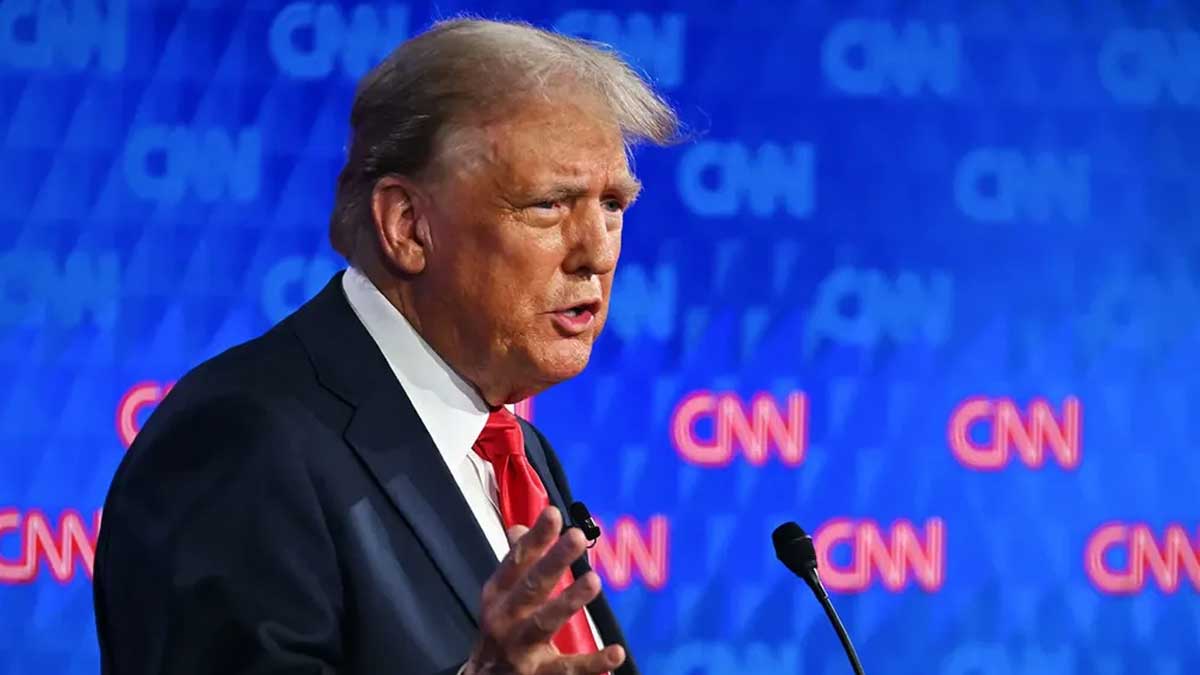- Home
- Billionaires
- Investing Newsletters
- 193CC 1000
- Article Layout 2
- Article Layout 3
- Article Layout 4
- Article Layout 5
- Article Layout 6
- Article Layout 7
- Article Layout 8
- Article Layout 9
- Article Layout 10
- Article Layout 11
- Article Layout 12
- Article Layout 13
- Article Layout 14
- Article Sidebar
- Post Format
- pages
- Archive Layouts
- Post Gallery
- Post Video Background
- Post Review
- Sponsored Post
- Leadership
- Business
- Money
- Small Business
- Innovation
- Shop
Recent Posts
Harris Accuses Trump of Reneging on Debate Deal

Former President Donald Trump has recently indicated his willingness to participate in debates with Vice President Kamala Harris, who is now widely expected to be the Democratic nominee for the 2024 presidential election. Trump’s declaration came in response to Harris’s criticisms, as she accused him of “backpedaling” on his previous commitment to engage in a debate with her in September.
In a statement made to reporters on Tuesday, Trump expressed his readiness to engage in multiple debates with Harris. He underscored the significance of debates as a crucial element of the presidential race, asserting that both the Republican and Democratic nominees have a “duty” to debate. Trump emphasized that debates are vital for voters to understand the differences between the candidates and make informed choices.
However, the situation took a turn on Thursday when Harris took to X (formerly known as Twitter) to address the issue. She expressed her readiness to debate Trump but accused him of reversing his earlier commitment. Harris highlighted that Trump had agreed to a debate scheduled for September 10, initially planned to be with President Joe Biden. Now, with Biden out of the race and Harris as the presumptive nominee, the debate with Trump was supposed to proceed as planned. Harris’s tweet suggested that Trump’s recent remarks indicate he is not following through on this agreement.
The debate planning has been complicated by Trump’s dissatisfaction with the current arrangements. Trump had originally agreed to two debates with Biden, with the first one taking place on June 27. This debate was marred by Biden’s subpar performance, which led to significant concerns about his age, cognitive abilities, and overall suitability for the presidency. Biden struggled to maintain his train of thought and required multiple corrections, which prompted calls for him to withdraw from the race. In the wake of Biden’s poor debate performance and his subsequent decision to end his campaign and endorse Harris, Trump’s focus shifted to debating Harris instead.
The specifics of the Harris-Trump debates are still up in the air. The second debate, which was scheduled for September 10 and to be hosted by ABC, is now uncertain. Harris has expressed a willingness to stick to the original date, but Trump has voiced his displeasure with ABC as the host. Trump has suggested that Fox News, which he perceives as less biased, would be a more suitable platform for the debate. He has also proposed rescheduling the debate to a Monday, adding further complexity to the debate scheduling.
Additionally, there is speculation that Trump may seek to alter the terms of the debates. Reports suggest that Trump considers the terms he previously agreed to as only applicable to debates with Biden, not with Harris. This potential shift could affect the format and scheduling of the debates, making it necessary for both parties to negotiate new terms.
The initial agreement between Trump and Biden included two debates, finalized in mid-May after a period of negotiation. Biden, who had been hesitant, eventually agreed to the debates, responding to Trump’s social media challenge with a willingness to participate in two debates. The first debate, held on June 27, was marked by Biden’s notable struggles, which led to widespread scrutiny of his performance and further calls for his withdrawal from the race. Biden’s eventual decision to end his campaign and endorse Harris as the Democratic nominee has now shifted the focus to the upcoming debates between Harris and Trump.
The viewership for the first Biden-Trump debate was substantial, with 51.3 million people tuning in. However, this figure represented a significant decline of about 30% compared to the viewership of their first debate in 2020. This drop in viewership underscores the changing dynamics of public interest in presidential debates and raises questions about the potential impact of the upcoming Harris-Trump debate on the overall election narrative.
Recent Posts
Categories
- 193 Countries Consortium Partner1
- 193cc Digital Assets2
- 5G1
- Aerospace & Defense48
- AI37
- Arts3
- Banking & Insurance11
- Big Data3
- Billionaires1,261
- Boats & Planes1
- Business332
- Careers13
- Cars & Bikes79
- CEO Network1
- CFO Network17
- CHRO Network1
- CIO Network1
- Cloud10
- CMO Network18
- Commercial Real Estate7
- Consultant1
- Consumer Tech194
- CxO1
- Cybersecurity73
- Dining1
- Diversity, Equity & Inclusion4
- Education7
- Energy8
- Enterprise Tech29
- Events11
- Fintech1
- Food & Drink2
- Franchises1
- Freelance1
- Future Of Work2
- Games149
- GIG1
- Healthcare79
- Hollywood & Entertainment203
- Houses1
- India’s 1000 Richest1
- Innovation46
- Investing2
- Investing Newsletters4
- Leadership65
- Lifestyle11
- Manufacturing1
- Markets20
- Media327
- Mobile phone1
- Money13
- Personal Finance2
- Policy569
- Real Estate1
- Research6
- Retail1
- Retirement1
- Small Business1
- SportsMoney42
- Style & Beauty1
- Success Income1
- Taxes2
- Travel10
- Uncategorized13
- Vices1
- Watches & Jewelry2
- world's billionaires1,230
- Worlds Richest Self-Made Women2
Related Articles
South Korea Plane Crash: A Tragic Loss and Global Mourning
The tragic plane crash at South Korea’s Muan International Airport on Sunday...
By 193cc Agency CouncilDecember 30, 2024H-1B Visa Debate Splits Trump Allies and Silicon Valley
The debate over H-1B visas has once again become a contentious issue,...
By 193cc Agency CouncilDecember 28, 2024Trump Moves $4B Stake in Truth Social Parent, Stock Drops 6%
Donald Trump recently transferred his 57% stake in Trump Media & Technology...
By 193cc Agency CouncilDecember 20, 2024House Rejects Trump-Backed Funding Bill, Shutdown Looms
The U.S. House of Representatives rejected a new government funding bill on...
By 193cc Agency CouncilDecember 20, 2024















Leave a comment